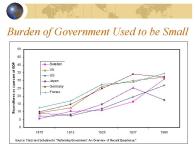I feel a bit like Goldilocks.
No, this is not a confession about cross-dressing or being transsexual. I’m the boring kind of libertarian.
Instead, I have a run-of-the-mill analogy. Think about when you were a kid and your parents told you the story of Goldilocks and the Three Bears.
your parents told you the story of Goldilocks and the Three Bears.
You may remember that she entered the house and tasted bowls of porridge that were too hot and also too cold before she found the porridge that was just right.
And then she found a bed that was too hard, and then another that was too soft, before finding one that was just right.
Well, the reason I feel like Goldilocks is because I’ve shared some “Rahn Curve” research suggesting that growth is maximized when total government spending consumes no more than 20 percent of gross domestic product. I think this sounds reasonable, but Canadians apparently have a different perspective.
Back in 2010, a Canadian libertarian put together a video that explicitly argues that I want a government that is too big.
Now we have another video from Canada. It was put together by the Fraser Institute, and it suggests that the public sector should consume 30 percent of GDP, which means that I want a government that is too small.
My knee-jerk reaction is to be critical of the Fraser video. After all, there are examples – both current and historical – of nations that prosper with much lower burdens of government spending
Singapore and Hong Kong, for instance, have public sectors today that consume less than 20 percent of economic output. Would those fast-growing jurisdictions be more prosperous if the burden of government spending was increased by more than 50 percent?
Or look at Canadian history. As recently as 1920, government outlays were 16.7 percent of economic output.  Would Canada have grown faster if lawmakers at the time had almost doubled the size of government?
Would Canada have grown faster if lawmakers at the time had almost doubled the size of government?
Recommended
And what about nations such as the United States, Germany, France, Japan, Sweden, and the United Kingdom, all of which had government budgets in 1870 that consumed only about 10 percent of GDP. Would those nations have been better off if the burden of government spending was tripled?
I think the answer to all three questions is no. So why, then, did the Fraser Institute conclude that government should be bigger?
There are three very reasonable responses to that question. First, the 30 percent number is actually a measurement of where you theoretically maximize “social progress” or “societal outcomes.” If you peruse the excellent study that accompanies the video, you’ll find that economic growth is most rapid when government consumes 26 percent of GDP.
Second, the Fraser research – practically speaking – is arguing for smaller government, at least when looking at the current size of the public sector in Canada, the United States, and Western Europe. According to International Monetary Fund data, government spending consumes 41 percent of GDP in Canada, 39 percent of GDP in the United States, and 55 percent of GDP in France.
the United States, and Western Europe. According to International Monetary Fund data, government spending consumes 41 percent of GDP in Canada, 39 percent of GDP in the United States, and 55 percent of GDP in France.
The Fraser Institute research even suggests that there should be significantly less government spending in both Switzerland and Australia, where outlays total “only” 34 percent of GDP.
Third, you’ll see if you read the underlying study that the author is simply following the data. But he also acknowledges “a limitation of the data,” which is that the numbers needed for his statistical analysis are only available for OECD nations, and only beginning in 1960.
This is a very reasonable point, and one that I also acknowledged when writing about some research on this topic from Finland’s Central Bank.
…those numbers…are the result of data constraints. Researchers looking at the post-World War II data generally find that Hong Kong and Singapore have the maximum growth rates, and the public sector in those jurisdictions consumes about 20 percent of economic output. Nations with medium-sized governments, such as Australia and the United States, tend to grow a bit slower. And the bloated welfare states of Europe suffer from stagnation. So it’s understandable that academics would conclude that growth is at its maximum point when government grabs 20 percent of GDP. But what would the research tell us if there were governments in the data set that consumed 15 percent of economic output? Or 10 percent, or even 5 percent? Such nations don’t exist today.
For what it’s worth, I assume the author of the Fraser study, given the specifications of his model, didn’t have the necessary post-1960 data to include small-state, high-growth, non-OECD jurisdictions such as Hong Kong and Singapore. If that data had been available, I suspect he also would have concluded that government should be closer to 20 percent of economic output.
I explore all these issues in my video on this topic.
The moral of the story is that government is far too large in every developed nation.
I suspect even Hong Kong and Singapore have public sectors that are too large, causing too many resources to be diverted from the private sector.
But since I’m a practical and moderate guy, I’d be happy if the burden of government spending in the United States was merely reduced back down to 20 percent of economic output.
P.S. Though I would want the majority of that spending at the state and local level.
P.P.S. Since I’m sharing videos today, here’s an amusing video from American Commitment about the joy of being “liberated” from employment.
And if you like snarky videos about Obamacare, here are some based on sexand mockery, and there’s even a Hitler parody.
P.P.P.S. This has nothing to do with public policy, but I got a good chuckle fromthis news out of Iraq.
A group of Sunni militants attending a suicide bombing training class at a camp north of Baghdad were killed on Monday when their commander unwittingly conducted a demonstration with a belt that was packed with explosives, army and police officials said. …Twenty-two ISIS members were killed, and 15 were wounded, in the explosion at the camp.
One of the reasons I laughed is that I recalled a cartoon that was sent to me many years ago. And when I dug into my humor folder, it was still there.
I think you’ll see the obvious connection.
And since we’re venturing into humor about self-detonating terrorists, here’s another joke from my treasure trove.
===================================
Guy goes into a sex shop and asks for an inflatable doll.
Guy behind the counter says, “Male or female?”
Customer says, “Female.”
Counter guy asks, “Black or white?
Customer says, “White.”
Counter guy asks, “Christian or Muslim?”
Customer says, “What the hell does religion have to do with it?”
Counter guy says, “The Muslim one blows itself up.”
===================================
And here’s another joke that’s worth sharing.
If this isn’t enough terrorism-related humor for you, we also have this collection of stereotypes I received from an English friend.
 This image, meanwhile, doubtlessly has caused a few nightmares in certain quarters.
This image, meanwhile, doubtlessly has caused a few nightmares in certain quarters.
And this Jay Leno joke is one of the best examples of anti-political correctness I’ve ever seen.



























Join the conversation as a VIP Member